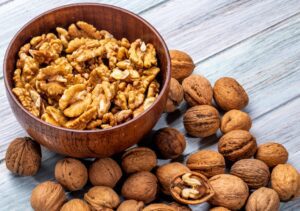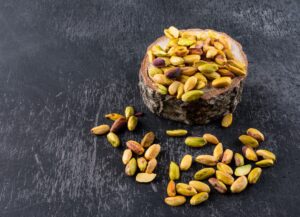Nuts are tiny nutritional powerhouses packed with goodness from nature. From almonds to walnuts, these little wonders offer a wealth of health benefits that can boost our well-being. Let’s explore the healthiest nuts you should be eating to nourish your body and delight your taste buds.
1. Almonds: The Nutritional Powerhouse
Key Health Benefits:
- Heart Health: Almonds are rich in monounsaturated fats, which can help lower bad cholesterol levels and reduce the risk of heart disease.
- Weight Management: Despite being calorie-dense, almonds can actually aid in weight management. Their combination of protein, fiber, and healthy fats helps promote feelings of fullness and satisfaction, reducing the likelihood of overeating.
- Nutrient Density: Almonds are a good source of vitamin E, magnesium, and antioxidants, which play vital roles in maintaining overall health and protecting against oxidative stress.
Incorporating Almonds into Your Diet:
- Green Salad Recipe with a Blueberry Twist
- Stuffed Bell Peppers with Chickpeas & Goat Cheese
- Almond Flour Energy Balls
- Sweet Potato Cookies with Almond Butter.
- Lentil Salad with Smoked (or Vegan) Chicken
- 5-Ingredient Almond Biscuits for Breakfast
- Almond Blueberry Muffins
2. Walnuts: Brain-Boosting Beauties 
Key Health Benefits:
- Brain Health: Walnuts are one of the best plant-based sources of omega-3 fatty acids, particularly alpha-linolenic acid (ALA), which is essential for brain health. Consuming walnuts regularly has been linked to improved memory, cognitive function, and mood.
- Heart Health: The omega-3 fatty acids in walnuts, along with their antioxidant content, help reduce inflammation and improve cholesterol levels, reducing the risk of heart disease.
- Antioxidant Power: Walnuts are packed with antioxidants, including polyphenols and vitamin E, which help combat oxidative stress and protect cells from damage caused by free radicals.
Incorporating Walnuts into Your Diet:
- Red Lentil Puree with Roasted Red Cabbage and Cranberries
- Oh-So-Delicious: Beet and Goat Cheese Chiabata Sandwich
- Beetroot Salad with Walnuts
- Roquefort and Pear Salad in Chicory Boats
- Roasted Bell Pepper and Walnut Dip Recipe
- Roasted Butternut Squash with Kale & Walnuts
- Rustic Chicory and Apple Salad with Walnuts
3. Pistachios: The Skinny on Snacking
Key Health Benefits:
- Weight Management: Despite their small size, pistachios are surprisingly filling. Their combination of protein, fiber, and healthy fats helps keep you feeling satisfied and may reduce overall calorie intake, making them a smart choice for weight management.
- Heart Health: Pistachios are rich in monounsaturated and polyunsaturated fats, which have been shown to improve cholesterol levels and reduce the risk of heart disease. Additionally, their high antioxidant content helps reduce inflammation and protect against oxidative stress.
- Nutrient Density: Pistachios are packed with essential nutrients, including vitamins B6 and E, copper, and manganese. These nutrients play important roles in supporting overall health and vitality.
Incorporating Pistachios into Your Diet:
- Enjoy a handful of pistachios as a satisfying snack on their own or mixed with other nuts and dried fruits.
- Sprinkle chopped pistachios over salads, yogurt, or oatmeal for added flavor, texture, and nutrition.
- Use ground pistachios as a coating for fish or chicken, or as a topping for desserts like ice cream or pudding.
- Incorporate pistachios into homemade granola bars, energy bites, or baked goods for a delicious and nutritious treat.
4. Cashews: Creamy and Nutritious
Key Health Benefits:
- Heart Health: Cashews are rich in monounsaturated fats, which have been linked to a reduced risk of heart disease. Additionally, they contain oleic acid, the same heart-healthy fat found in olive oil.
- Weight Management: Despite being calorie-dense, cashews can actually help with weight management. Their combination of protein and fiber helps keep you feeling full and satisfied, reducing the likelihood of overeating.
- Nutrient Density: Cashews are a good source of essential nutrients, including vitamins E, K, and B6, as well as minerals like copper, magnesium, and zinc. These nutrients play vital roles in supporting overall health and well-being.
Incorporating Cashews into Your Diet:
- Quinoa Salad with Chickpeas and Cashew
- Cashew Cream
- Pad Thai with Prawns
- Rice Salad with Delightful Dressing
5. Pecans: Antioxidant-Rich Treats

Key Health Benefits:
- Antioxidant Power: Pecans are rich in antioxidants, including flavonoids, phenolic compounds, and vitamin E, which help neutralize harmful free radicals and protect cells from oxidative damage.
- Heart Health: The monounsaturated fats found in pecans can help lower bad cholesterol levels and reduce the risk of heart disease. Additionally, their high levels of magnesium may help lower blood pressure and improve circulation.
- Nutrient Density: Pecans are packed with essential nutrients, including vitamins A and B, zinc, and potassium, as well as fiber and protein. These nutrients support overall health and vitality, making pecans a nutritious addition to any diet.
Incorporating Pecans into Your Diet:
- Enjoy a handful of pecans as a delicious and nutritious snack on their own or mixed with dried fruits for added sweetness.
- Add chopped pecans to oatmeal, yogurt, or salads for extra crunch and flavor.
- Use pecans as a topping for desserts like ice cream, yogurt, or fruit crisps for a decadent and nutritious treat.
- Incorporate pecans into baked goods like muffins, cookies, or bread for a nutty and flavorful twist.
6. Brazil Nuts: Selenium Superstars
Key Health Benefits:
- High in Selenium: Brazil nuts are the richest food source of selenium, with just one nut providing well over 100% of the recommended daily intake. Selenium plays a crucial role in supporting immune function, thyroid health, and antioxidant defense against oxidative stress.
- Antioxidant Power: Selenium acts as a cofactor for antioxidant enzymes like glutathione peroxidase, helping to neutralize free radicals and protect cells from damage. This antioxidant activity may reduce inflammation, lower the risk of chronic diseases, and support overall health.
- Heart Health: Selenium may help reduce the risk of heart disease by supporting healthy blood vessels, reducing inflammation, and preventing oxidative damage to cholesterol particles. Additionally, selenium deficiency has been linked to an increased risk of heart disease and other cardiovascular conditions.
Incorporating Brazil Nuts into Your Diet:
- Enjoy one or two Brazil nuts as a convenient and nutritious snack to boost your selenium intake.
- Chop Brazil nuts and sprinkle them over salads, yogurt, or oatmeal for added crunch and flavor.
- Incorporate Brazil nuts into homemade trail mix or energy bars for a delicious and energizing snack.













